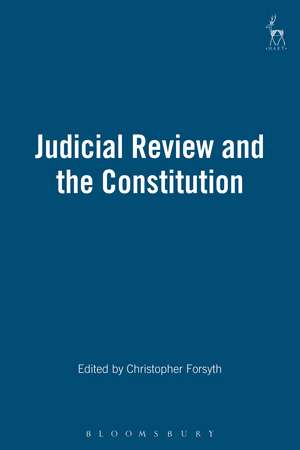Judicial Review and the Constitution
Editat de Christopher Forsythen Limba Engleză Hardback – 30 apr 2000
Preț: 721.20 lei
Preț vechi: 1031.60 lei
-30% Nou
Puncte Express: 1082
Preț estimativ în valută:
138.02€ • 143.56$ • 113.94£
138.02€ • 143.56$ • 113.94£
Carte tipărită la comandă
Livrare economică 14-28 aprilie
Preluare comenzi: 021 569.72.76
Specificații
ISBN-13: 9781841131054
ISBN-10: 1841131059
Pagini: 480
Dimensiuni: 156 x 234 x 37 mm
Greutate: 0.85 kg
Editura: Bloomsbury Publishing
Colecția Hart Publishing
Locul publicării:London, United Kingdom
ISBN-10: 1841131059
Pagini: 480
Dimensiuni: 156 x 234 x 37 mm
Greutate: 0.85 kg
Editura: Bloomsbury Publishing
Colecția Hart Publishing
Locul publicării:London, United Kingdom
Caracteristici
These essays present opposing sides of the debate over the foundations of judicial review. The discussion of how to characterise the 'ultra vires' doctrine is located in the highly topical and political context of constitutional change.
Notă biografică
Dr Christopher Forsyth is a Fellow of Robinson College and Assistant Director of the Centre for Public Law at the University of Cambridge. is Reader in Law at University College London Dr. iur (Hamburg)
Cuprins
PART I THE DEBATE BEGINS1. Is the Ultra Vires Rule the Basis of Judicial Review?Professor Dawn Oliver2. Of Fig Leaves and Fairy Tales: The Ultra Vires Doctrine, the Sovereignty of Parliament and Judicial ReviewChristopher Forsyth3. Ultra Vires and the Foundations of Judicial ReviewProfessor Paul Craig4. Illegality: The Problem of JurisdictionLord Justice Laws5. The Ultra Vires Doctrine in a Constitutional Setting: Still the Central Principle of Administrative LawMark ElliottPART II THE JURISPRUDENTIAL DEBATE6. Ultra Vires and Institutional InterdependenceNicholas Bamforth7. Form and Substance in the Rule of Law: A Democratic Justification for Judicial ReviewProfessor David Dyzenhaus8. Judicial Review and the Meaning of LawLord Justice LawsPART III CONSTITUTIONAL REFORM AND THE FOUNDATIONS OF JUDICIAL REVIEW9. The Foundations of Review, Devolved Power and Delegated PowerProfessor Brigid Hadfield10. The Courts, Devolution and Judicial ReviewProfessor Paul Craig11. Convention Rights and Substantive Ultra ViresProfessor David Feldman12. Fundamental Rights as Interpretative Constructs: The Constitutional Mark Elliott
Recenzii
In Judicial Review and the Constitution, Forsyth has gathered together the best of the previously published articles on the topic, and has commissioned new work from an impressive selection of leading public law scholars. The result is a collection that will prove of immense utility to anyone wanting an exhaustive survey of the arguments made in the debate.
Within the public law field, this book will (deservedly) prove among the foremost influences on the next generation of legal scholarship.
Within the public law field, this book will (deservedly) prove among the foremost influences on the next generation of legal scholarship.
Descriere
This collection of essays presents opposing sides of the debate over the foundations of judicial review.
